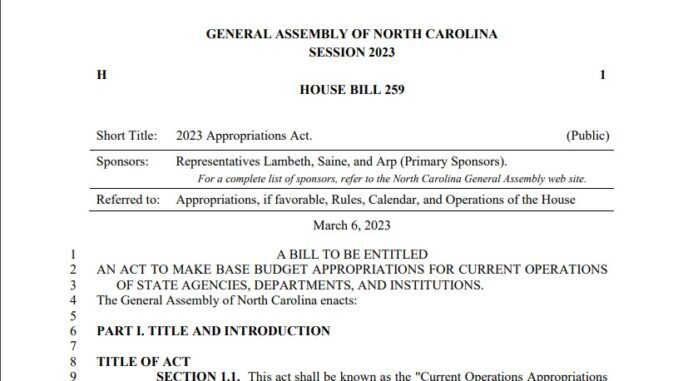
RALEIGH — House Speaker Tim Moore (R-Kings Mountain), joined by House budget chairs, unveiled the chamber’s $29.7 billion budget proposal at a press conference on March 29.
The 2023 Appropriations Act contains a number of spending items related to mental health while adding $15 million to farmland preservation, $100 million to the disaster recovery relief fund, $1 billion to transportation projects, $1 billion to the Clean Water and Drinking Water Reserve, $1.4 billion to regional economic reserves, and $3.6 billion for infrastructure needs, including $2 billion for water and sewer projects.
The House proposal includes pay increases for state employees by 4.25% in the first year of the budget and 3.25% in the second year. Over the biennium, State Highway Patrol personnel are looking at an 11% increase. Other law enforcement and corrections officers will see just over a 10% increase.
Around $70 million in additional funds for teacher supplement pay in low-wealth county districts is included with educator pay. With the inclusion of step increases and additional supplements rolled in, teacher pay will increase by around 10.2% over the biennium; 5.5% in year one, and the balance in year two. Additionally, master’s degree pay is being restored.
The governor’s budget had proposed an 18% increase for teachers. His proposed budget, which increased spending by more than 20% over the next two years, was dubbed by lawmakers as “reckless.”
Higher education employees will also see raises. Both the UNC System and NC Community Colleges System will get a 7.5% raises over the two years. Additional funding is included for recruitment and retention purposes.
There is an additional 2% in raises spanning the two years to retain certain employees.
State retirees will see a recurring 1% Cost of Living (COLA) increase for each of the budget years.
North Carolinians will be able to keep more of what they earn through tax cuts which will drop the individual income tax to 4.5% in 2024 – a year ahead of schedule. The child tax credit will also increase by 20% and lawmakers are including a new tax adoption credit.
Per sources in the House, Gov. Roy Cooper has already agreed to the budget in advance as part of the agreement reached with Senate Leader Phil Berger (R-Eden) and Moore to pass Cooper’s long-sought-after goal of expanding Medicaid in the state.
That agreement has given rise to a number of policy items packed into the House’s proposal such as expanding school choice and other education policy issues covering charter schools as well as the Opportunity Scholarship Program, which offers funds for students to attend the private school of their choice.
The budget expands the eligibility for K-8 students applying for Opportunity Scholarships by dropping the requirement of having been a previous public school student in order to apply. The income eligibility threshold currently at 200% of the amount needed for a student to qualify for a free and reduced-price lunch remains the same.
Just prior to the press conference on the House proposal, Senate Republicans issued a statement rolling out a new bill to expand the OSP to “all families” awarding grants using a “sliding scale.” Household income would determine the amount awarded, ensuring families that need the most assistance receive the largest scholarships.
Charter schools that want to have remote academies or be completely remote-learning-based also get a nod in the budget. There is also language making the NC Charter School Advisory Board the final stop for approving new charter schools or renewing of existing schools instead of the state board of education. Various guidelines for the approval and renewal processes are included in that change as well as an appeal process that would involve review by the state board of education.
A key provision for parents is “Academic Transparency,” which details how the public will be informed about courses and materials used in the classroom. In the same vein, another area will “Modernize Selection of Instructional Materials” by directing school boards to select and adopt academic materials for each area of the state’s standard course of study in K-12.
The process for Renewal Schools will be streamlined and the budget lays out the plans and guidelines they must follow for items like submitting new plans. The changes will require the State Board review.
The controversy over the proposed creation of a School of Civic Life and Leadership at the University of North Carolina at Chapel Hill may become moot as the bill includes nonrecurring funds to create the school. This school will focus on developing democratic competencies based on American history and political tradition.
The Medical Freedom Act (House Bill 98), which bars employment discrimination against individuals for refusing COVID-19 vaccination and prohibits the N.C. Commission for Public Health from requiring the vaccination in order to attend K-12 public schools, is another policy item included in the budget. The prohibition would also apply to state employees.
The House budget includes language making the State Bureau of Investigations (SBI) an independent agency. A related provision of the budget would move the state crime lab under SBI due to its new independence.
The provision is timely with SBI Director Bob Schurmeier giving surprise testimony at House hearing on Mar. 28 in which he called for the agency to be made independent. On two occasions during the hearing, he said Cooper’s chief of staff and general counsel asked him for his resignation and threatened him with investigations of racial discrimination.
Three sections of the budget delve into election and judicial areas covered by bills filed this session.
Legislation already filed in the House barring the State Board of Elections from being a member of Electronic Registration Information Center, Inc. (ERIC) is mirrored in the budget.
Similarly, another section bars the state and county boards of elections from accepting outside or private money donations, such as “Zuck Bucks,” for any reason, including hiring of temporary workers. In the previous legislative session, Senate Bill 725 sought the same goal. The bill was passed but was vetoed by the governor with no override attempt made.
With the inclusion of barring accepting outside donations, two North Carolina counties may have to back out of a related program. Both Forsyth and Brunswick County Board of Election are participating in a Zuckerberg-tied program as reported in January 2023. Brunswick County’s Board of Commissioners also recently passed a resolution on March 20 supporting the ban of private money in North Carolina elections.
Should the current rehearing case of Voter ID being reconsidered by the N.C. Supreme Court get a green light, the budget allots $3.5 million to fund implementation of the state’s Voter ID constitutional amendment passed by voters in 2018.
The mandatory retirement age for appellate judges is raised from 72 to 76 years of age in the budget language. The only exception is that of applying to be an emergency justice in a letter to the governor.
The budget also takes on abortion, by preventing state funds from being used in “the performance of” or in administrative support of an abortion. Exemptions are made for certain cases where a mother’s life may be endangered or the pregnancy is the result of rape.
Additionally, the House proposal includes a prohibition on Cap and Trade requirements for CO2 emissions. No state agent, including the governor and officials at the Department of Environmental Quality, will be allowed to require a public energy utility that uses the power produced for itself to take part in carbon offsetting programs, per the budget proposal.
Over the last two years, Cooper has used rulemaking and executive orders to establish emissions reductions with a “net-zero” greenhouse gas emissions goal.
Along with barring such emissions programs, the budget includes a prohibition on any requirement controlling emissions on new vehicles.


